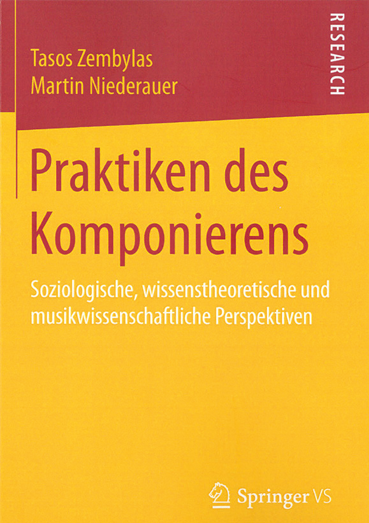Tasos Zembylas and Martin Niederauer, Composing Processes and Artistic Agency: Tacit Knowledge in Composing
Rouledge, 2017 (forthcoming).
The book Composing Processes and Artistic Agency documents a project by music sociologists, philosophers, and musicologists that was conducted at and funded by the mdw along with the Jubilee Fund of the City of Vienna and the FWF. The topic at hand is examined from sociological, epistemological, and musicological perspectives. (And in view of the fact that approximately one third of this book is based on musicological research by Andreas Holzer, it is somewhat unclear just why he receives no mention as an author and is even absent from the table of contents.)

The study itself contains a broadly contextualised analysis of the composing process, from the initial ideas for contemporary compositions to their performance, based on conversations with 23 composers who live in Austria. Works for traditional instruments and/or electronics by Marko Ciciliani, Karlheinz Essl, Clemens Gadenstätter, Katharina Klement, and Joanna Wozny are taken as case studies that include the associated sketches, notations, notes, drawings, digital audio files, and/or composing diaries.
The authors examine the complex process of composing as a series of open and dynamic processes (imagining, listening, feeling, conceiving, trying out, contemplating, notating, correcting, etc.) from three main theoretical perspectives: those of contingency, teleo-affectivity, and effect. They then propose a topography (“The Topography of Composing Work”) that consists of four interlinked clusters: working parameters and resources, material objects, immaterial objects, and peers/non-peers.
The second chapter (“The Processuality of Composing”) is devoted to the connection between physical activities and cognitive ones such as exploration, understanding, evaluation, and doing. The two corresponding forms of knowledge – latter encompassing general, scientific, formal-technical, and local knowledge, the former containing knowledge of an artistic-practical, bodily, work process-related, and situational nature – are the focus of the third chapter (“Orchestrating Different Forms of Knowledge”).
The fourth and final chapter illuminates musicological perspectives on the composing process, first historically and then with reference to the components of practice and their interrelationships (Ciciliani, Essl, Wozny).
The abovementioned themes – from general theoretical concepts to concrete aspects of the creative process – are presented in a systematic and deductive manner and given in-depth analysis, in constant dialogue with the relevant sociological, philosophical, psychological, and musicological literature.
Please note:
Further current publications can be found at www.mdw.ac.at/wissenschaft/publikationen

